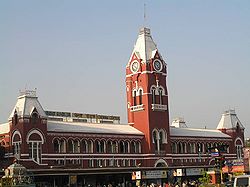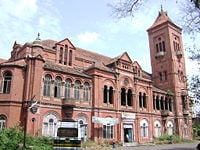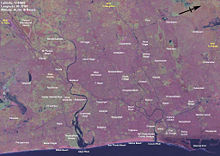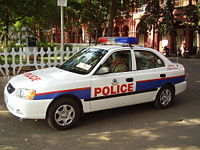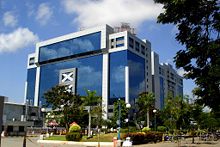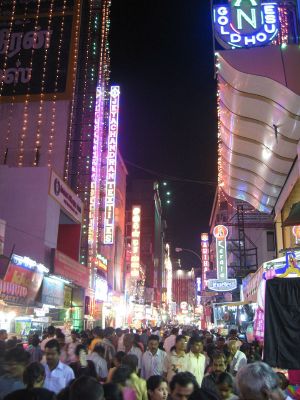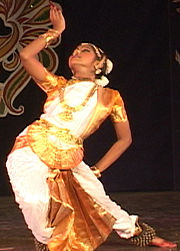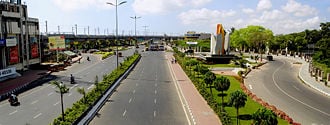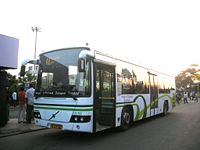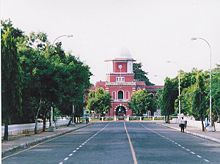Chennai
| Chennai Madras |
|
| The landmark Chennai Central Station | |
| Coordinates: 13¬į5‚Ä≤N 80¬į16‚Ä≤E | |
|---|---|
| Country | India |
| State | Tamil Nadu |
| District | Chennai[1] |
| Former name | Madrasapattinam (Madras) |
| Area | |
|  - Metropolitan city | 426.7 km² (164.48 sq mi) |
|  - Metro | 1,189 km² (464.45 sq mi) |
| Elevation | 6 m (20 ft) |
| Population (2011)[2][3] | |
|  - Metropolitan city | 6,221,782 |
|  - Metro | 8,696,010 |
|  - Metro rank | 4th |
|  - Demonym | Chennaite |
| Postal index number | 600 xxx, |
| Website: www.chennaicorporation.gov.in | |
Chennai (Tamil: ŗģöŗĮÜŗģ©ŗĮćŗģ©ŗĮą), formerly known as Madras, the capital of the Indian state of Tamil Nadu, sits on the Coromandel Coast of the Bay of Bengal. With an estimated population of 7.5 million (2007), it has the fourth largest metropolitan population in India and one of the largest metropolitan areas in the world.[4]
The British established the city in the seventeenth century, developing it into a major urban center and naval base. By the twentieth century, it had become an important administrative center, as the capital of the Madras Presidency.
Chennai's economy has a broad industrial base in the automobile, technology, hardware manufacturing, and health care industries. The city serves as home to much of India's automobile industry and stands as the country's second-largest exporter of information technology (IT) and information-technology-enabled services (ITES), behind Bangalore.[5] An international airport and two major ports serves the city. Five national highways and two railway terminals connect Chennai to the rest of the country. Thirty-five countries have consulates in Chennai.
Chennai hosts a large cultural event, the annual Madras Music Season, which includes performances by hundreds of artists. The city has a vibrant theater scene, positioned as an important center for the Bharatanatyam, a classical dance form. The Tamil movie industry, known as Kollywood, has its center in the city; the soundtracks of the movies dominate its music scene. Chennai has earned a reputation for its sport venues and hosts an Association of Tennis Professionals (ATP) event, the Chennai Open. The city faces problems of water shortages, traffic congestion and air pollution. The state and local governments have undertaken initiatives such as the Veeranam project and the construction of mini-flyovers to address those problems.
Names
The name Chennai, an eponym, etymologically derived from Chennapatnam, the name of the town that grew up around Fort St George, had been built by the British in 1640. The town had been, most likely, named after Damarla Chennappa Nayak, father of the ruling chieftain of the area, Venkatapathy Nayak,[6]
The former name, Madras, derives from Madraspatnam, a fishing village that lay to the north of Fort St. George. The origin of the name Madraspatnam has been a subject of disagreement. One theory holds that the Portuguese, who arrived in the area in the sixteenth century, may have named the village Madre de Deus.[7] The city had been officially renamed Chennai in 1996, about the same time that officials changed the names of many Indian cities. Madras derives from Portuguese name.[8]
History
The region around Chennai has served as an important administrative, military, and economic center since the first century. It has been ruled by various South Indian dynasties, notably the Pallava, the Chola, the Pandya, and Vijaynagar. The town of Mylapore, now part of Chennai, once served as a major Pallavan port. The Portuguese arrived in 1522 and built a port called São Tomé after the Christian apostle, St Thomas, said to have preached in the area between 52 and 70 C.E. In 1612, the Dutch established themselves near Pulicat, just north of the city.
On August 22, 1639, Francis Day of the British East India Company bought a small strip of land on the Coromandel Coast from the Vijayanagara King, Peda Venkata Raya in Chandragiri. Damerla Venkatapathy, the Nayak of Vandavasi ruled the region. He granted the British permission to build a factory and warehouse for their trading enterprises. A year later, the British built Fort St George, which became the nucleus of the growing colonial city. In 1746, the French under General La Bourdonnais, the Governor of Mauritius captured Fort St George and Madras plundering the town and its outlying villages. The British regained control in 1749 through the Treaty of Aix-la-Chapelle and fortified the town's fortress wall to withstand further attacks from the French and another looming threat, Hyder Ali, the Sultan of Mysore. By the late eighteenth century, the British had conquered most of the region around Tamil Nadu and the northern modern-day states of Andhra Pradesh and Karnataka, establishing the Madras Presidency with Madras as the capital.[9] Under British rule, the city grew into a major urban center and naval base.
With the advent of railways in India in the late nineteenth century, the thriving urban center connected to other important cities such as Mumbai (formerly known as Bombay) and Kolkata (formerly Calcutta), promoting increased communication and trade with the hinterland.
Chennai constituted the only Indian city attacked by the Central Powers during World War I, when the German light cruiser SMS Emden shelled an oil depot on September 22, 1914, as it raided shipping lanes in the Indian Ocean, causing disruption to shipping.[10] After India gained its independence in 1947, the city became the capital of Madras State, renamed the state of Tamil Nadu in 1969. The violent agitations of 1965 against the imposition of Hindi as the national language, marked a major shift in the political dynamics of the city and the whole state.[11]
In 2004, an Indian Ocean tsunami lashed the shores of Chennai, killing many and permanently altering the coastline.[12]
Geography and climate
Chennai sits on the southeast coast of India in the northeast of Tamil Nadu on a flat coastal plain known as the Eastern Coastal Plains with an average elevation around 6.7 meters (20 ft), and its highest point at 60 m (200 ft). Two rivers meander through Chennai, the Cooum River (or Koovam) through the center and the Adyar River to the south. Both rivers suffer from heavy pollution with effluents and waste from domestic and commercial sources. The state government periodically removes silt and pollution from the Adyar, much less polluted than the Cooum. A protected estuary on the Adyar forms a natural habitat for several species of birds and animals. The Buckingham Canal, 4 km (3 miles) inland, runs parallel to the coast, linking the two rivers. The Otteri Nullah, an east-west stream, runs through north Chennai and meets the Buckingham Canal at Basin Bridge. Several lakes of varying size lay on the western fringes of the city. Red Hills, Sholavaram and Chembarambakkam Lake supply Chennai with potable water. Groundwater sources have become brackish.[13]
Clay, shale and sandstone mostly comprise Chennai's soil. Sandy areas are found along the river banks and coasts, such as Tiruvanmiyur, Adyar, Kottivakkam, Santhome, George Town, Tondiarpet and the rest of coastal Chennai. Here rainwater runoff percolates quickly through the soil. Clay underlies most of the city including T. Nagar, West Mambalam, Anna Nagar, Perambur and Virugambakkam. Areas of hard rock include Guindy, Velachery, Adambakkam and a part of Saidapet.
| Climate chart for Chennai | |||||||||||
|---|---|---|---|---|---|---|---|---|---|---|---|
| J | F | M | A | M | J | J | A | S | O | N | D |
 
36
30
20
|
 
10
31
20
|
 
7
33
22
|
 
15
35
26
|
 
26
39
28
|
 
37
38
27
|
 
91
36
26
|
 
116
35
26
|
 
119
34
26
|
 
306
32
24
|
 
355
30
22
|
 
138
29
21
|
| temperatures in ¬įC precipitation totals in mm source: Nirvana Tour[14] | |||||||||||
|
Imperial conversion
| |||||||||||
Chennai divides into four parts: North, Central, South and West. North Chennai is primarily an industrial area. Central Chennai constitutes the commercial heart of the city and includes an important business district, Parry's Corner. South Chennai and West Chennai, previously mostly residential, have become commercial, home to a growing number of information technology firms, financial companies and call centers. The city has expanded quickly along the Old Mahabalipuram Road and the Grand Southern Trunk Road (GST Road) in the south and towards Ambattur, Koyambedu and Sriperumbdur in the west.
Chennai lies on the thermal equator, also coastal, which prevents extreme variation in seasonal temperature. For most of the year, the weather remains hot and humid. Late May and early June, known locally as Agni Nakshatram ("fire star") or as Kathiri Veyyil, make up the hottest part of the year, with maximum temperatures around 38‚Äď42¬†¬įC (100‚Äď107¬†¬įF). The coolest part of the year is January, with minimum temperatures around 19‚Äď20¬†¬įC (66‚Äď68¬†¬įF). The lowest temperature recorded reached 15.8¬†¬įC (60.44¬†¬įF) and highest 45¬†¬įC (113¬†¬įF). The average annual rainfall measures about 1,300¬†mm (51¬†inches). The city gets most of its seasonal rainfall from the north-east monsoon winds, from mid-September to mid-December. Cyclones in the Bay of Bengal sometimes hit the city. Highest annual rainfall recorded is 2,570¬†mm (101¬†in) in 2005. The most prevailing winds in Chennai are the Southwesterly between May and September and the Northeasterly during the rest of the year.
Administration and utility services
| City officials, as of September 2007 | ||
| Mayor | Ma. Subramanian | |
| Deputy Mayor | R. Sathya Bama | |
| Corporation Commissioner | Rajesh Lakhoni | |
| Commissioner of Police | G. Nanjil Kumaran | |
The Corporation of Chennai, consisting of 155 councilors who represent 155 wards directly elected by the city's residents, govern Chennai city. From among themselves, the councilors elect a mayor and a deputy mayor who preside over about six standing committees. Chennai, the capital of Tamil Nadu state, houses the state executive and legislative headquarters primarily in the Secretariat Buildings on the Fort¬†St¬†George campus but also in many other buildings scattered around the city. The Madras High Court, whose jurisdiction extends across Tamil Nadu and Puducherry, represents the highest judicial authority in the state, resides in the city. Chennai has three parliamentary constituencies‚ÄĒChennai North, Chennai Central and Chennai South‚ÄĒand elects eighteen Members of the Legislative Assembly (MLAs) to the state legislature.
The metropolitan region of Chennai covers many suburbs part of Kanchipuram and Thiruvallur districts. Town municipalities govern the larger suburbs, while town councils called panchayats govern the smaller ones. While the city covers an area of 174 km_ (67 mi_). The metropolitan area spreads over 1,189 km_ (458 mi_). The Chennai Metropolitan Development Authority (CMDA) has drafted a Second Master Plan that aims to develop satellite townships around the city. Contiguous satellite towns include Mahabalipuram to the south, Chengalpattu and Maraimalai Nagar to the southwest, and Kanchipuram town, Sriperumpudur, Tiruvallur and Arakkonam to the west.
The Greater Chennai Police department, a division of the Tamil Nadu Police, constitutes the law enforcement agency in the city. A commissioner of police heads the city police force while administrative control rests with the Tamil Nadu Home Ministry. The department consists of 36 subdivisions with a total of 121 police stations, 15 having received ISO 9001:2000 certification. The Chennai City Traffic Police (CCTP) manages the city's traffic. the Chennai Metropolitan Police patrol The Metropolitan suburbs, and the Kanchipuram and Thiruvallur police departments patrol outer district areas.
The Corporation of Chennai and municipalities of the suburbs provide civic services. JBM Fanalca Environment Management, a private company, handles garbage in most zones, the Chennai Corporation in the other zones. The Metropolitan Water Supply and Sewage Board, popularly referred to as Metro Water, handle the water supply and sewage treatment. The Tamil Nadu Electricity Board supplies electricity. Six mobile phone companies and four landline companies provide the city's telephone service,[15] which also provide broadband Internet access, along with Sify and Hathway.
Historically, Chennai has relied on annual monsoon rains to replenish water reservoirs, as no major rivers flow through the area. Steadily growing in population, the city has faced water supply shortages, and its ground water levels have been depleted. An earlier Veeranam Lake project failed to solve the city's water problems, but the New Veeranam project, which became operational in September 2004, has greatly reduced dependency on distant sources. In recent years, heavy and consistent monsoon rains and rainwater harvesting (RWH) by Chennai Metrowater at its Anna Nagar Rain Center have significantly reduced water shortages. Newer projects like the Telugu Ganga project that bring water from water-surplus rivers like the Krishna River in Andhra Pradesh have eased water shortages. The city has been constructing sea water desalination plants to further increase the water supply.[16]
Economy
Chennai has a diversified economic base anchored by the automobile, software services, hardware manufacturing, healthcare and financial services industries. As of 2000, the city's total personal income reached Rs 12,488.83 crores, making up 10.9 percent of the total income of Tamil Nadu. In 2001, the total workforce in Chennai numbered about 1.5 million, 31.79 percent of its population. According to the 1991 census, most of the city's workforce was involved in trade (25.65 percent), manufacturing (23.52 percent), transportation (10.72 percent), construction (6.3 percent) and other services (31.8 percent). Chennai metropolitan area accounts for over 75 percent of the sales tax revenue in the state.[17]
The city hosts around 30 percent of India's automobile industry and 35 percent of its auto components industry. A large number of automotive companies including Hyundai, Ford, BMW, Mitsubishi, TVS Motors (TVS), Ashok Leyland and Madras Rubber Factory (MRF), have manufacturing plants in and around Chennai. The Heavy Vehicles Factory at Avadi produces military vehicles, including India's main battle tank: Arjun MBT. The Integral Coach Factory manufactures railway coaches and other rolling stock for Indian Railways. The Ambattur-Padi industrial zone houses many textile manufacturers, and an SEZ for apparel and footwear manufacture has been set up in the southern suburbs of the city.[18] Chennai contributes more than 50 percent of India's leather exports.
The city serves as an electronics manufacturing hub with multinational corporations like Dell, Nokia, Motorola, Samsung, Flextronics and Foxconn setting up electronics and hardware manufacturing plants, mainly in the Sriperumbudur Special Economic Zone (SEZ). Many software and software services companies have development centers in Chennai, which contributed 14 percent of India's total software exports of Rs.144,214 crores during 2006‚Äď2007, making it the second-largest exporter of software in the country, behind Bangalore. Prominent financial institutions, including the World Bank, have back office operations in the city. Three large national level commercial banks call Chennai home and many state level co-operative banks, finance and insurance companies. Some of India's well-known health care institutions such as Apollo Hospitals (the largest private healthcare provider in Asia), Sankara Nethralaya and Sri Ramachandra Medical Center base in the city, making it one of the preferred destinations for medical tourists from across the globe. Telecom giants Ericsson and Alcatel-Lucent, pharmaceuticals giant Pfizer and chemicals giant Dow Chemicals have research and development facilities in Chennai. TICEL bio-tech park and Golden Jubilee bio-tech park at Siruseri house biotechnology companies and laboratories. Chennai has a fully computerized stock exchange called the Madras Stock Exchange.
Demographics
Residents of Chennai, called Chennaiites, numbered 4.34 million in Chennai city, while the total metropolitan population reached 7.04 million as of 2001. In 2001, the population density in the city reached 24,682 per km² (9,534 per mi²), while the population density of the metropolitan area measured 5,922 per km² (2,287 mi²), making it one of the most densely populated cities in the world. The sex ratio numbers 951 females for every 1,000 males, slightly higher than the national average of 934. The average literacy rate has been calculated at 80.14 percent, much higher than the national average of 64.5 percent. The city has the fourth highest population of slum dwellers among major cities in India, with about 820,000 people (18.6 percent of its population) living in slum conditions. That number represents about 5 percent of the total slum population of India. In 2005, the crime rate in the city calculated at 313.3 per 100,000 people, accounting for 6.2 percent of all crimes reported in major cities in India. The number of crimes in the city showed a significant increase of 61.8 percent from 2004.[19]
According to the 2001 census, Hindus constitute about 82.27 percent of the city's population, and Muslims (8.37 percent), Christians (7.63 percent) and Jains (1.05 percent). Tamils, speaking Tamil, comprise the majority of the residents of Chennai. Chennaiites speak English widely, especially in business, education and white collar professions. Sizeable Telugu and Malayalee communities live in the city. Chennai also has a large migrant population coming from other parts of Tamil Nadu and the rest of the country. As of 2001, out of the 937,000 migrants (21.57 percent of its population) in the city, 74.5 percent came from other parts of the state, 23.8 percent from rest of India and 1.7 percent from outside the country.[20]
Culture
Chennai's culture reflects its diverse population. The city has earned renown for its classical dance shows and Hindu temples. Every December, Chennai holds a five-week long Music Season celebrating the 1927 opening of the Madras Music Academy. It features performances (kutcheries) of traditional Carnatic music by hundreds of artists in and around the city. Chennai has become a center for Bharatanatyam, a classical dance form that originated in Tamil Nadu. Kalakshetra, on the beach in the south of the city, has become a major performing center for Bharatanatyam.[21]
Chennai serves as a base for the large Tamil movie industry, dubbed Kollywood after Kodambakkam, home to most of the movie studios. The industry makes more than 150 Tamil movies a year, and its soundtracks dominate the city's music. Chennai's theaters stage many Tamil plays; political satire, slapstick comedy, history, mythology and drama number among the popular genres.[22] English plays are also staged in the city.
Pongal, celebrated over five days in January, constitutes Chennai's most important festival. Tamil New Year's Day, signifying the beginning of the Tamil year, usually falls on April 14. Chennai celebrates almost all major religious festivals such as Deepavali, Eid and Christmas. Tamil cuisine in Chennai includes vegetarian and non-vegetarian dishes. Many of the city's restaurants offer light meals or tiffin, which usually include rice-based dishes like pongal, dosai, idli and vadai, served with steaming-hot filter coffee.
Transport
The Chennai International Airport, comprising the Anna International Airport and the Kamaraj Domestic Airport, handles domestic as well as international flights and ranks as the third busiest airport in India. The city connects to major hubs in South Asia, South East Asia, the Middle East, Europe and North America through more than 30 national and international carriers. The airport ranks as the second busiest cargo terminus in the country. The existing airport has been undergoing further modernization and expansion. A new Greenfield Airport, with four runways, will be constructed at an estimated cost of Rs 2,000 crore in Sriperumbudur.[23]
Two major ports, Chennai Port, one of the largest artificial ports, and Ennore Port serve the city. The Chennai port stands as India's second busiest container hub, handling automobiles and general industrial cargo. The Ennore port handles cargo such as coal, ore and other bulk products. Local fishing boats and trawlers use a smaller harbor at Royapuram.
Chennai connects well to other parts of India by road and rail. Five major national highways radiate outward towards Mumbai, Kolkata, Trichy, Tiruvallur and Pondicherry. The Chennai Mofussil Bus Terminus (CMBT), the terminus for all intercity buses from Chennai, ranks the largest bus station in Asia. Seven government-owned transport corporations operate inter-city and inter-state bus services. Many private inter-city and inter-state bus companies also operate services to and from Chennai.
The city has two main railway terminals. Chennai Central station, the city's largest, provides access to trains to major cities like Mumbai, Kolkata, Bangalore, Delhi, Hyderabad, and Coimbatore as well as to smaller towns across India. Chennai Egmore constitutes a stop for trains traveling primarily within Tamil Nadu; it also handles a few inter-state trains.[24]
Buses, trains, and auto rickshaws constitute the most popular form of public transport within the city. The Chennai suburban railway network consists of four broad gauge rail sectors, three of which are Chennai Central‚ÄďArakkonam, Chennai Central‚ÄďSullurpeta and Chennai Beach‚ÄďChengalpattu. An elevated Mass Rapid Transit System (MRTS), which links Chennai Beach to Thiruvanmiyur and interlinks with the remaining rail network makes up the fourth sector. The city has plans for an underground Metro. The Metropolitan Transport Corporation (MTC) runs an extensive city bus system consisting of 2,815 buses on 551 routes and transports an estimated 3.85 million passengers daily. Vans, popularly known as Maxi Cabs, ply many routes in the city and provide an alternative to bus. Metered call taxis, tourist taxis and auto rickshaws also may be hired. Chennai's transportation infrastructure provides coverage and connectivity, but growing use has caused traffic congestion and pollution. The government has tried to address these problems by constructing flyovers at major intersections, starting with the Gemini flyover, built in 1973 over the most important arterial road, Anna Salai.[25]
Media
Newspaper publishing started in Chennai with the launch of a weekly, The Madras Courier, in 1785. The weeklies The Madras Gazzette and The Government Gazzette followed in 1795. The Spectator, founded in 1836, marked the first English newspaper in Chennai owned by an Indian and became the city's first daily newspaper in 1853.[26] The first Tamil newspaper, Swadesamitran, was launched in 1899.
The Hindu, The New Indian Express, The Deccan Chronicle and evening dailies, The Trinity Mirror and The News Today represent the major English dailies published in Chennai. As of 2004, The Hindu became the city's most read English newspaper, with a daily circulation of 267,349. The major business dailies published from the city include The Economic Times, The Hindu Business Line, Business Standard, and The Financial Express. The major Tamil dailies include the Dina Thanthi, Dinakaran, Dina Mani, Dina Malar, Tamil Murasu, Makkal Kural and Malai Malar. Neighborhood newspapers such as The Annanagar Times and The Adyar Times cater to particular localities. Magazines published from Chennai include Ananda Vikatan, Kumudam, Kalki, Kungumam, Swathi (Telugu magazine), Frontline and Sportstar.
Doordarshan runs two terrestrial television channels and two satellite television channels from its Chennai centre, which was set up in 1974. Private Tamil satellite television networks like Sun TV, Raj TV, Star Vijay, Jaya TV, Makkal TV and Kalaignar TV broadcast out of Chennai. The Sun Network, a Rs. 4,395 crore public firm, operates in the city and constitutes the country's second-largest broadcasting company in viewership share. The group owns 19 TV channels in all major South Indian languages, FM radio stations in 11 cities and a few Tamil magazines and newspapers. While SCV and Hathway constitute the major cable TV service providers, DD Direct Plus, Dish TV and Tata Sky may be watched through Direct-to-home. Chennai stands out as the first city in India to have implemented the Conditional Access System for cable television. Radio broadcasting started from the radio station at the Rippon Buildings complex, founded in 1930 and then shifted to All India Radio in 1938. The city has two AM and ten FM radio stations, operated by Anna University, All India Radio and private broadcasters.
Education
Either the Tamil Nadu government or private organizations, some with financial aid from the government run schools in Chennai. Schools use English or Tamil as the medium of education. Most schools affiliate with the Tamil Nadu State Board, the Matriculation Board or the Central Board of Secondary Education (CBSE). A few schools affiliate with the Indian Certificate of Secondary Education (ICSE) board, Anglo-Indian board or the Montessori system. Schooling begins at the age of three with two years of kindergarten followed by ten years of primary and secondary education. Students then need to complete two years of higher secondary education in either science or commerce before being eligible for college education in a general or professional field of study. 1,389 schools dot the city, 731 primary, 232 secondary and 426 higher secondary schools.[27]
The Indian Institute of Technology Madras (IIT Madras) and Anna University represent two well known centers for engineering education in the city. Most city colleges that offer engineering programs affiliate with Anna University. Madras Medical College (MMC), Stanley Medical College (SMC), Kilpauk Medical College and Sri Ramachandra Medical College and Research Institute (SRMC) embody the notable medical colleges in Chennai.
Colleges for science, arts and commerce degrees typically affiliate with the University of Madras, which has three campuses in the city. Some colleges such as Madras Christian College, and Loyola College run themselves independently. Research institutions like the Central Leather Research Institute (CLRI), the Central Electronics Engineering Research Institute (CEERI) and the Institute for Financial Management and Research (IFMR) locate in the city. The Connemara Public Library represents one of four National Depository Centres in India that receive a copy of all newspapers and books published in India. It has been declared a UNESCO information center.[28]
Sports
Cricket represents the most popular sport in Chennai. The M.A. Chidambaram Stadium (MAC) in Chepauk constituting one of the oldest cricket stadiums in India. The Chemplast Cricket Ground on the IIT Madras campus also hosts first class matches. Prominent cricketers from the city include former Test-captains S. Venkataraghavan and Kris Srikkanth. A cricket fast bowling academy, the MRF Pace Foundation, whose coaches include Dennis Lillee, calls Chennai home.
Chennai, which hosts an Association of Tennis Professionals (ATP) event, the Chennai Open, has produced popular tennis players. The city boasts a Premiere Hockey League (PHL) team, the Chennai Veerans, and has hosted many hockey tournaments such as the Champions Trophy. Football and athletic competitions play out at the Jawaharlal Nehru Stadium, which also houses a multi-purpose indoor complex for competition in volleyball, basketball and table tennis. Water sports take place in the Velachery Aquatic Complex. Chennai served as the venue of the South Asian Games (SAF Games) in 1995.[29]
Auto racing in India has been closely connected with Chennai since its beginnings shortly after independence. Motor racing events take place on a special purpose track in Irungattukottai, Sriperumbudur, which has also been the venue for several international competitions. Horse races take place at the Guindy Race Course, while the Madras Boat Club hosted rowing competitions. The city has two 18-hole golf courses, the Cosmopolitan Club and the Gymkhana Club, both established in the late nineteenth century. Viswanathan Anand, the chess World champion and the world's top ranked chess player as of October 2007, grew up in Chennai. Other athletes of repute from Chennai include table tennis players Sharath Kamal and two-time world carrom champion, Maria Irudayam. The city has a rugby team called the Chennai Cheetahs.
Sister cities
 Denver, Colorado, United States
Denver, Colorado, United States Volgograd, Russia
Volgograd, Russia Frankfurt, Germany
Frankfurt, Germany
In April 2007, San Antonio, Texas, United States, expressed interest in a partnership.[30]
Notes
- ‚ÜĎ The Chennai metropolitan area also includes portions of Kanchipuram and Tiruvallur districts.
- ‚ÜĎ Cities having population 1 lakh and above. censusindia. The Registrar General & Census Commissioner, India. Retrieved March 26, 2012.
- ‚ÜĎ Tamil Nadu district wise population. Tamil Nadu census website. Retrieved March 26, 2012.
- ‚ÜĎ Srivasthan,¬†A,¬†"New land use proposals mooted in draft Master Plan", The Hindu, April 12, 2007. Retrieved February 3, 2009.
- ‚ÜĎ "Chennai has the 'potential' to become Detroit of South Asia: IT Secretary", The Hindu, July 18, 2005. Retrieved February 3, 2009.
- ‚ÜĎ Srinivasan,¬†T.A,¬†"Face behind the name", The Hindu, February 28, 2002.
- ‚ÜĎ Kurian,¬†Nimi,¬†"And the city grew", The Hindu, August 31, 2007. Retrieved February 3, 2009.
- ‚ÜĎ Tharoor,¬†Sashi,¬†"In India's name game, cities are the big losers", International Herald Tribune, September 06, 2002. Retrieved February 3, 2009.
- ‚ÜĎ "Madras, India (Capital)". Encyclopaedia Brittanica (eleventh edition). (1911). Retrieved on February 3, 2009.
- ‚ÜĎ Playne, Somerset and J.W. Bond, Arnold Wright (1914). Southern India: Its History, People, Commerce and Industrial resources. Foreign and Colonial Compiling and Publishing Company, London, 51‚Äď52. ISBN 8120613449. Retrieved February 3, 2009.¬†
- ‚ÜĎ Guha,¬†Ramachandra,¬†"Hindi against India", The Hindu, January 16, 2005. Retrieved February 3, 2009.
- ‚ÜĎ Altaff, K and J. Sugumaran, Md. S. Naveed (July 10, 2005). Impact of tsunami on meiofauna of Marina beach, Chennai, India. Current Science 89 (1).
- ‚ÜĎ Lakshmi,¬†K,¬†"It's no cola, it's the water supplied in Korattur", The Hindu, July 13, 2004. Retrieved February 3, 2009.
- ‚ÜĎ Error on call to template:cite web: Parameters url and title must be specified. Nirvana Tour.
- ‚ÜĎ Narayanan,¬†R.Y,¬†"Touchtel arrives in Coimbatore", The Hindu, September 5, 2002. Retrieved February 3, 2009.
- ‚ÜĎ "IVRCL to set up desalination plant near Chennai", The Hindu, August 12, 2005. Retrieved February 3, 2009.
- ‚ÜĎ Economy (PDF). Second Master Plan - II pp. pp. III-14, III-19, III-20. Chennai Metropolitan Development Authority. Retrieved February 3, 2009.
- ‚ÜĎ Ravi Kumar,¬†N,¬†"Mahindra City, a world of its own", The Hindu, December 3, 2004. Retrieved February 3, 2009.
- ‚ÜĎ Crimes in Mega Cities (PDF). Crime In India¬†‚Äst2005. Govt. of India. Retrieved February 3, 2009..
- ‚ÜĎ Demography (PDF). Second Master Plan - II pp. I-11. Chennai Metropolitan Development Authority. Retrieved February 3, 2009.
- ‚ÜĎ GR.¬†"Yearning for Chennai ambience", The Hindu, December 2, 2000.
- ‚ÜĎ Kumar,¬†Ranee,¬†"Laughter, the best medicine", The Hindu, December 10, 2003. Retrieved February 3, 2009.
- ‚ÜĎ "New greenfield airport to be set up near Chennai", The Hindu, May 22, 2007. Retrieved February 3, 2009.
- ‚ÜĎ "35 trains to run at higher speed", The Hindu, August 27, 2004. Retrieved February 3, 2009.
- ‚ÜĎ Srivathsan,¬†A,¬†"Bridge across time Skyline", The Hindu, September 29, 2007.
- ‚ÜĎ Muthiah,¬†S,¬†"A landmark's last vestiges vanish", The Hindu, February 3, 2003. Retrieved February 3, 2009.
- ‚ÜĎ No. of Schools in the Town¬†: Chennai. Govt. of Tamil Nadu. Retrieved February 3, 2009.
- ‚ÜĎ Highlights. Connemara Public Library. Retrieved February 3, 2009.
- ‚ÜĎ Thyagarajan,¬†S,¬†"On the road to restoration", The Hindu, December 4,2003. Retrieved February 3, 2009.
- ‚ÜĎ "U.S. city San Antonio's offer to Chennai", The Hindu, April 12, 2007. Retrieved February 3, 2009.
ReferencesISBN links support NWE through referral fees
- Dinakaran, Dharangini. 2006. "Streets to Shelter in Chennai, India." Psychiatric Services: a Journal of the American Psychiatric Association. 57(6): 884. ISSN 10752730
- Giry, S. 2004. "Chennai Dispatch: SOL The Indian government's stealth campaign to bar the country's lower castes from changing religions." NEW REPUBLIC. (4658): 12-14. ISSN 00286583
- Keay, John. 2000. India: a history. New York: Grove Press. ISBN 9780802137975.
- "Society - Out of Bondage - Frontline, Chennai." 2003. World Press Review. 50(9): 42. ISSN 01958895
External links
All links retrieved December 5, 2023.
| |||||
| |||||
| |||||
| |||||
| |||||||||||||||||
Credits
New World Encyclopedia writers and editors rewrote and completed the Wikipedia article in accordance with New World Encyclopedia standards. This article abides by terms of the Creative Commons CC-by-sa 3.0 License (CC-by-sa), which may be used and disseminated with proper attribution. Credit is due under the terms of this license that can reference both the New World Encyclopedia contributors and the selfless volunteer contributors of the Wikimedia Foundation. To cite this article click here for a list of acceptable citing formats.The history of earlier contributions by wikipedians is accessible to researchers here:
The history of this article since it was imported to New World Encyclopedia:
Note: Some restrictions may apply to use of individual images which are separately licensed.
